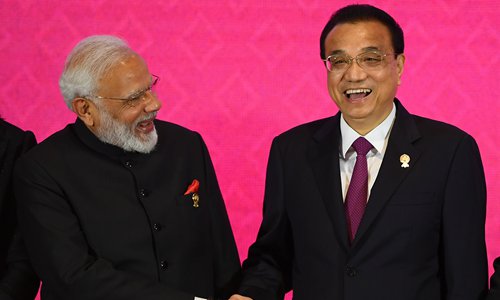HOME >> SOURCE
Japan unlikely to abandon RCEP: experts
By Yang Kunyi Source:Global Times Published: 2019/12/1 19:38:41 Last Updated: 2019/12/2 9:28:06
Deal likely to go ahead without membership of India

India's Prime Minister Narendra Modi (left) shakes hands with China's Premier Li Keqiang at the 3rd Regional Comprehensive Economic Partnership (RCEP) Summit in Bangkok on November 4, on the sidelines of the 35th Association of Southeast Asian Nations Summit. India did not make a final decision on RCEP, as other member states moved to conclude their negotiations and plan to sign the deal in 2020. Photo: AFP
Japan has too much to gain and will not abandon the Regional Comprehensive Economic Partnership (RCEP) easily, even without the presence of India, despite recent comments by a Japanese official on a possible withdrawal, experts said on Sunday.
Japan's State Minister for Economy, Trade and Industry Hideki Makihara was reported by Bloomberg as saying that Japan is not likely to sign the RCEP if India doesn't join. India announced that it was withdrawing from the RCEP in November, saying that it would hurt its vulnerable citizens.
"It is unlikely that Japan will withdraw from the RCEP if India is not in," Chen Fengying, a research fellow at the China Institutes of Contemporary International Relations in Beijing, told the Global Times, "The stakes are too high for Japan."
According to Chen, Japan will be one of the biggest winners from a successful RCEP if India joins, as the country has been eyeing the huge market in India of more than 1.3 billion people for a long time. But an RCEP with 14 countries that excludes both India and Japan will not be beneficial to Japan's economy.
"Even without India, RCEP will be the world's largest trade pact. It is too big a cake for Japan to pass up," Chen said. "It is more likely that Japan will continue to persuade India into continuing negotiations rather than pulling out."
So far, Makihara's remarks are the only comment relating to Japan's possible withdrawal from the pact. No official statement from the government has been released as of press time.
The proposed RCEP involves ASEAN's 10 member states, as well as China, India, Japan, South Korea, Australia and New Zealand. Once signed, the pact will be the world's largest trade pact, which will make up one-third of the world's GDP.
Japan has been seeking to enter India' s market, but the chances that the two countries can reach a deal outside the RCEP would be dim, said Zhou Rong, a senior research fellow at the Chongyang Institute for Financial Studies at the Renmin University of China.
"The fact is that India is not ready for free trade with anybody at the moment," Zhou said. "Modi is under domestic pressure ... further opening up Indian market will be a blow to its local manufacturers and farmers. Likewise, India has little incentive to further its free trade with Japan, either."
India has signed the bilateral Economic Partnership Agreement with Japan in 2011, but its trade deficit has widened following the FTA. In the fiscal year of 2018-19, its trade deficit with Japan was $184 billion, compared with $137 billion in 2014-15.
"The RCEP as the region's most comprehensive trade deal will bring long-term benefits and stimulus," said Zhou. "As China has already established integrated trade relationships with most members of the RCEP, it's likely that a pact without India will be signed."
Posted in: ECONOMY